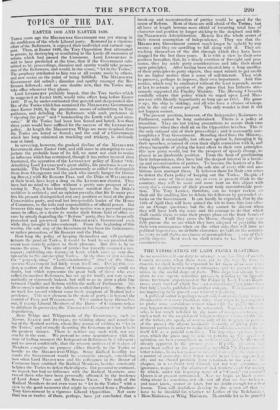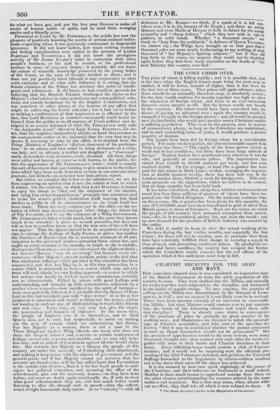TuE vis - DicATmx oF LADY FLoni 11 STING As We C.011,4dCri..-d
it our duty to attempt sons: 'set
. couroy vdtoti these were yet t:, muuntr, we shad hardly be expected to let 1:1
they are beginning to assume a substsnee, ;•,;•os:1 ii selves in the useful shape of foci's. 'Fhis ;sty given to cue sepert, sometime pies :1, rslet]ss t., nious treatment csperiv need at the Palace i 1,.,' 1: • A, -
INC.'S: every V.-07'd of which has ....en r
that lath's uncle. published in zill,,t!i„r t:. A tEst'itnpoing to be passed I.vcr It .1 A politival writer is perhap: nevcr disagreeable es a more thankless auty. -..1.k1
tO prObe SOUR' C.rICA:110IN ith
A...•r its
may- happen 51111;w:weakly to be cots-es:Jed. sake, is too much relished by the mass ef tee
such a task to the suspicion oe vol,eas 11, lOts t.: Or the writer, (to speak, of (oarse. 0111.,it th2 r, ' :0
of the press.) the almost im vitai)'e pain innocent parties in ()pier tEl strike die refl , 1 b.-. itself felt as a paininl com:itit JJ. The impL.rt;.„ s, s. - ever, which the press may be dole 1;; sj ;
agitation, are best exem,,'In,d. as :,s t• already npparent in ths. L.: It' ' IICVIT been called to Ile- to v.-hich r. Filso.ee.‘es. - letter relates, in soul' a mate,er as to semrler an sedln.e.t:c a matter of necessity, I al !eller IV oh I never 1...11 .■
all; and we should probably have remained., to .t.h.e
chapter, in a no doubt very hlissinl. but not very atIvanoi,s, ignorance, respecting the character and tendem:es of the s. ,:y by which, under the imposieg minks of a " Court.- our .vourof:.1 Queen is at present surrounded. Now we begin to know ssnss- thing about it ; something, not all--not :ill that we hare to know, and must know, sooner or later, but no doubt enough for a iirst lesson. Time is ill thou dless develop in due sesson nil that sve have to be thankhd 11w, whether to Ladies of the ltedebandk r. Men-Midwives, or Whig Ministers. Meanwhile let us be grateful
for what we have got, and not the less pray Heaven to make all maids of honour maids of spirit, and to send them avenging uncles and a friendly press.
Presented at Court by Mr. FITZGERALD, the public has now the pleasure of positively knowing the merits of several eminent indivi- duals respecting whom it was previously condemned to disgraceful ignorance. It did not know before, how much retiring modesty and feeling consideration were united in the persons of Ladies PORTMAN and TAVISTOCK j it did not know the prodigious activity of Sir JAMES CLARK'S mind in connexion with other people's business, or his zeal in morals, or his professional acumen in cases of encysted dropsy ; it probably did not know the extent of scientific knowledge possessed by the young ladies of the Court, or the turn of thought familiar to them ; and it does not yet positively know (though it may conjecture) to what noble examples and to what noble influence it is owing, that the female eduation of the Palace has attained this point of intelli- gence and refinement. It did know, or had excellent grounds for believing, that the Boudoir Premier discharged his duties as her Majesty's chief adviser in some gratuitous and extra-political rela- tions, not exactly- bargained for by the English Constitution, and was somehow or other always at the bottom of any affair that might be enlivening the Court calendar ; but it had never before so striking a confirmation of that impression as is afforded by the fact, that Lord Ilawrisos (a courtier—necessarily much better in- formed than the public as to all matters of Court polities and in- trigue) is no sootier informed of what Mr. FITZCIMALD truly calls "6 the deplorable insult" offered to Lady FLORA Ilssreses, his Sis- ter, than his suspicion instinctively alights on Lord MELBOURNE as Vie most probable author of it ; insomuch that the very first step he deems it necessary to take in the affidr, is to demand from the Prime Minister of England a "distinct disavowal of his participa- tion" in an odious and base cabal to bring dishonour on a virtu- ous lady, and to alienate a mother and duughter ! a "disavowul" easily demanded—and, of course, easily obtained. All these things were either not known, or never so well known, to the public, be- fore the appearance of Mr. FITZGERALD'S letter ; which is exactly the sort ofdocument that was wanting to give sanction to the reflec- tions which have been made from time to time in our own and other journals, but hitherto on no better text than private report. But whilst we consider this letter so far satisfactory, we are far from expressing an opinion that it sets the matter at rest to which it relates. On the contrary, we think that Lord HasTisais is bound to carry his threat to "find out the originator of the slander, and bring him or her to punishment," promptly into execution, and to make his sister's perfect vindication (still wanting this final stroke) as public in all its circumstances as the insult itself has been made. There are meny enigmas yet in the affidr, on the so- lution of which may depend, amongst other things, the future lot of The Favourite, not to say the existence of a Whig Government. Mr. FITZGERALD'S letter reveals much, but at the same time leaves much to be revealed : it gives us several quantities, but does not tell us how to combine them, so that the true sum of the evil does not appear. That the Queen herself is to be acquitted of any de- sign to outrage the feelings of Lady FLORA, or grieve her mother the Dutelless of KENT—that she is, moreover, innocent of all par- ticipation in the spirit and motives actuating those about her, and ought on every occasion to be, morally, as much as she is socially, distinguished from them—we never entertained the slightest doubt ; not because Queens " can do no wrong," but because every cir- cumstancc of her Majesty's present position points o the fact that that wholesome influence which presided ie her education has been superseded, and that her Majesty is at this time proceeding in a course which is unnatural to her,—a course which may not (we trust will not) obtain her own lasting approval,—a course in which her actions can hardly be looked upon as spontaneous, certainly not as characteristic. Gifted by nature with good feelings and understanding, and brought up with conscientious solicitude by a mother whose ceunsels—now sacrificed to the spirit of intrigue— were once gratefully followed, it is probable that the Queen of Eng- land in this her twentieth year only " does wrong" in so thr as her judgment is concerned, and wants nothing but the power, seldom mot wanting at such an age, of distinguishing between false friends and real 011eS. Years may, or they may not, give the requi-
site penetration and firmness of character. In the mean time, the people of Engheld owe it to themselves, and to their Queen also, not to wait, but respectfully to insist on rooting out the nest of vermin which are undermining her throne. For her Majesty as a woman, there is not a man in the Three Kimehans (unless Whig officials are men) who does not share the deepest interest and concern—a certain tenderness of feeling—as tower& a young and amiable, and, we may add, help- less lady, and an ardour of resentment against all who would abuse her. But towards her Majesty as a Queen, the people of this country are under the necessity of formalizing their attachment,
and making it keep terms with the objects of government and the
general good; and it her Majesty cannot yet perceive that her servants are treacherous, or if she has still to learn that Favouritism is the certain ruin of states, then it is for her loyal people to anti- cipate her political education, and, assuming the office of the schoolmaster, give out the necessary lesson ;—as they have done before, and must no doubt again occasionally do, if only to show what good schoolmasters they are, and how much better worth listening to after all—though rude in speech—than the softest- toned of right honourable daily tutors. As to " chivalry"—with all
deference to Mr. BURKE—we think, if a spark of it is left any- where now, it is in the breasts of time People ; and there we advise Queens and even Maids of Honour to look in future for the manly sympathy and " cheap defence" which they now seek in vain in palaces, at noble hands. Whether " a thousand swords" ass ready to "leap from the scabbards" in defence of Queen VICTORIA, we cannot say ; the Whigs have brought us to that pass that a thousand pikes are more nearly fbrthcoming, to say nothing of sixty thousand of "liar Majesty's fighting subjects :" but if they did leap forth in this cause, we suspect they could not be sheathed again before they had done tardy execution on the heads of "the best Ministry this country ever had."



























 Previous page
Previous page